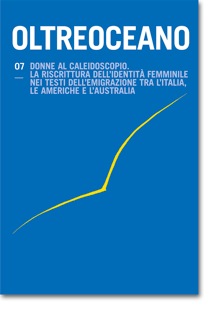Menesteos, marinero de abril di María Teresa León o il mito della nostalgia
Keywords:
viaggio, sradicamento, esilioAbstract
Il romanzo di María Teresa León, sebbene ispirato da una poesia del marito Rafael Alberti, concentra tutti i motivi della letteratura dell’autrice, realizzata per lo più nell’esilio argentino: l’evocazione del paese lontano, che per essere ormai perduto viene mitizzato, il sentimento dello sradicamento, lo smarrimento di trovarsi in terre straniere, il bruciante desiderio del ritorno, il castigo della guerra che guasta tutto, la pace e il paradiso appena ritrovati, la solitudine che insegue chimere che altro non sono che assenze e vuoti incolmabili.
Menesteos by Maria Teresa Leon or the Myth of Nostalgia
The novel by María Teresa León, although inspired by a lyric of her husband Rafael Alberti, sums all the motives typical of the author’s writing, mostly realized during her exile in Argentina: the recollection, and consequent mythicization of her far away country, the feeling of uprootedness, the bewilderment of being in a foreign land, the burning desire of a return, the punishment of a war that spoils all, the peace and heaven just recaputerd, the solitude searching chimeras which are only mean absences and unbridgeable voids.
Downloads
References
Álvarez de Armas, O. (Ed.) (2005): María Teresa León. Memoria de la hermosura. Madrid: Fundación Autor.
Ciaramelli, F. (2000): La distruzione del desiderio. Bari: Dedalo.
Detienne, M. (1980): Mito/rito. In Enciclopedia Einaudi (pp. 348-363 s.v.). Torino: Einaudi.
Eliot, Th. S. (2004): La terra desolata. Intr. di C. Miłosz. A. Tonelli (Ed., trad.). Milano: Feltrinelli.
Estébanez Gil, J. C. (2003): María Teresa León. Escritura, compromiso y memoria. Valladolid: Instituto Castellano-Leonés de la Lengua.
Lavagetto, M. (2007-2008): La fine dopo la fine. La Torre di Babele, 5, pp. 11-22.
León, M. T. (1975): Memoria de la melancolía. Madrid: Losada.
León, M. T. (2011): Menesteos, marinero de abril. G. Torres (Ed., intr. e annot.). Nebrera. Madrid: Bercimuel.
Marrast, R. (1990): La obra del exilio de María Teresa León: novela y autobiografía. In Homenaje a María Teresa León (pp. 75-87). Madrid: Universidad Complutense.
Paz, O. (1986): El arco y la lira. México: Fondo de Cultura Económica.
Perugini, C. (2009): Rafael Alberti tra due sponde. Ripensando a Ora marítima. In E. Guagliano (Ed.), Incontri e Disincontri tra Europa e America. Encruentros y Desencuentros entre Europa y América (pp. 111-115). Salerno: Centro Studi Americanistici.
Perugini, C. (2012): Menesteos, el antihéroe de María Teresa León. In J. M. Losada Goya & M Guirao Ochoa (Eds.), Myth and Subvertion in the Contemporary Novel. Actas del Congreso Internacional Mito y subversion en la novela contemporánea, Madrid, Universidad Complutense (9-11 marzo 2011), (pp. 81-91). Newcastle upon Tyne: Cambridge Scholars Publishing.
Pope, R. D. (1991): La autobiografía del exilio: el ser previamente preocupado de Rafael Alberti y María Teresa León. In J. M. Naharro Calderón (Ed.), El exilio de las Españas de 1939 (¿Adónde fue la canción?), (pp. 369-378). Barcelona: Antrophos.
Prete, A. (Ed.), (1992): Nostalgia. Storia di un sentimento. Milano: Cortina.
Recalcati, M. (2012): Ritratti del desiderio. Milano: Cortina.
Roses, J. (Ed.), (2004): María Teresa León, compromiso y melancolía. Córdoba: Diputación de Córdoba.
Starobinsky, J. (1992): Il concetto di nostalgia. In A. Prete (Ed.), Nostalgia. Storia di un sentimento (pp. 115-126). Milano: Cortina.
Torres Nebrera, G. (1996): Los espacios de la memoria. La obra literaria de María Teresa León. Madrid: Ediciones de la Torre.
Torres Nebrera, G. (1996): Introducción. In M. T. León, Menesteos, marinero de abril (pp. 9-28). Madrid: Bercimuel.
Downloads
Published
How to Cite
Issue
Section
License

This work is licensed under a Creative Commons Attribution-NonCommercial-ShareAlike 4.0 International License.
The authors undertake to comply with the following conditions, which are considered accepted at the time of submission of their contributions.
The sending of a text implies that it is unpublished and not submitted to be published elsewhere.
1. If accepted, the author shall confer on the publisher the right to publish and distribute it both in paper form and in the online electronic edition. The published articles will be downloadable and made available in open access.
2. Provided that it correctly indicates that the first publication took place in the journal Oltreoceano. Rivista sulle migrazioni the author has the right to: a) reproduce the article in separate extracts or collected in a volume; b) publish the article on their personal website or teaching site provided that these sites are of a non-commercial nature; c) deposit the article in online archives of a non-commercial nature, linked to the institution they belong to or as part of projects for the non-commercial dissemination and open access of scientific works.
The use of contributions by third parties, for commercial or otherwise unauthorized purposes, is not allowed. The publisher declines all responsibility for the unauthorized use of the material published in the journal.












